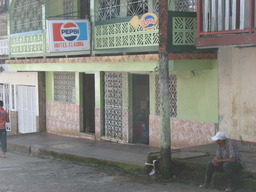
Bluefields
 Bluefields |
The boy with the beautiful smile interrupted our conversation as Irina and I walked down a dusty road in Pearl Lagoon. He was holding something out toward us. Most other places I wouldn't have broken stride, presuming that he was peddling something I wasn't interested in buying. But, his question seemed sincere; I paused to listen.
"Can you play this game?", Wylie asked.
I'd seen, or more-often, heard, these toys all around town. Remote as Pearl Lagoon may be, everybody along the Mosquito Coast seemed to be playing with the current must-have toy. On dozens of occasions I'd seen boys--grown men, occasionally--walking down the street working one hand into a rhythm with something that produced an enormous racket. The noise sounded somewhere between that of a motor piston and the whirr of a cicadia. I was glad this boy was offering his toy for us to play with. Over the past days I'd wondered just what they were and how they worked.
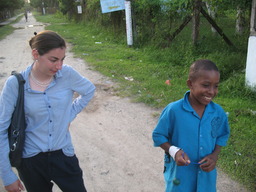 Irina Observes Wylie's Clacataca Action |
I couldn't do it. The balls would bounce against each other a few times but wouldn't splay out along an even arc. Almost immediately, the cord would twist around itself and get snarled up around my fingers.
"No, no. Not like that. Give them to me... ", Irina insisted. I handed the toy to her.
Irina swirled the balls around a few times but couldn't work the toy into its rhythm, either. We asked Wylie how to do it.
"Like this," the boy demonstrated. Clack-clack-clack-clack.
We had to have one.
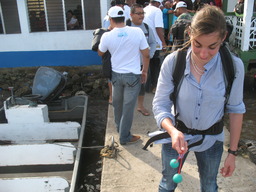 Irina Attempts Clacataca, Bluefields |
Bluefields had plenty of shops. By the time our boat came in they were all open. I spent two hours walking around town enquiring at every place that sold toys or other objects for children. Complicating my quest was the fact that many native speakers of Spanish have settled in Bluefields over recent years. Unlike back in Pearl Lagoon, I could seldom rely on the local Creole English to fully communicate what it was I wanted. I've never studied Spanish, so what I can say is very much street-level, the type of formulaic sentences that come up in travel situations. Still, I managed to express myself with what little I can say. I'm sure my grammar was filled with mistakes and I sounded stupid, but I did manage to convey what I wanted:
"Good morning. I am looking for a toy for children. It has two small balls and a cord. 'Clack-clack-clack-clack'."
Everybody I asked understood exactly what I was asking after. But they always referred me to some other shop down the road. Several times people were certain that a certain shop named "Galileo" would carry the toy--but when I went there even they couldn't tell me where to find it.
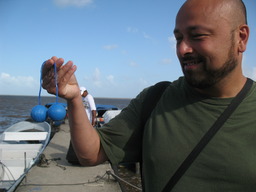 David Can't Figure How to Set it Into Motion |
"Clacataca!", he said both excitedly and onomatopoetically.
He might actually have called it a clacatlaca or maybe it was a clacatraca. Everybody else I asked after that seemed to call the toy by a slightly different name. Whatever it was, nobody in town carried it. All remaining stores referred me back to the main supply store, Galileo.
I wandered back down the spit along the water where Irina had set to meet for lunch. Appropriately enough, the restaurant's name was Tia Irene's.
"So? Success?", Irina asked.
"No," I said with genuine dejection.
"You see people playing with them everywhere," I continued on. "But, where are they buying them? I stopped a boy on the street and asked him where he got his. He directed me back to the central market. I didn't see them anywhere there. At least I managed to see his up close. And I figured out what they're called: 'clacataca'. They're definitely a homemade sort of thing, not of 'Made-in-China' manufacture. You know what I think they might be made from? I think the balls could be those flotation devices they string rope through when they want it to float in water. Maybe I could make my own... "
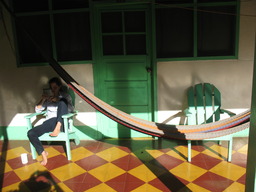 Hammock in Honduras |
"You know why it's something that you find here and something we've never seen?", Irina asked me. "It's the kind of toy that parents where we're from wouldn't allow their kids to play with. It's too loud."
"Yeah, that has to be part of it," I said. "This is the land of 200-decibel reggae and country music blaring. People here sure have tolerance for ear-splitting racket. But, I think it's also because kids in developed countries are all playing on their Gameboy or whatever electronic gadget. Remember how when we were back in Pakistan you'd see children running along the side of the road playing by using a stick to keep a tire or the rim of a wheel rolling down the street? Before I traveled outside the developed world I'd seen that only in old comic strips. Distractions here just aren't so fancy."
After our meal we ambled down the slip to catch a speedboat back into inland Nicaragua. As we approached, I made a last-ditch suggestion:
"We've still got 20 minutes before our boat leaves. Why don't I meet you near the ticket window in 10 minutes? I want to see if any stalls off the pier carry clacatacas."
The first stall I walked up to had a large bundle of clacatacas wound together dangling from a nail in a post. At 10 cordobas each that converted into USD 35¢, per toy. I selected four different colors, paid, then slipped them into my bag.
I found Irina smoking a cigarette out along the dock.
"So? No luck?", she said, not able to see the purchases inside my bag.
I broke into a broad smile.
"Heh. Check this out," I said, spreading my bag open. "I bought four. Choose a couple colors for yourself."
Irina selected pink and blue.
Today, even after a full day of practice, neither of us are able to work our clacatacs into a groove. I likened it to riding a bicycle; Irina made an analogy to the first time attempting to play with a yo-yo or hula-hoop.
We'll have to keep on practicing our clacataca technique along down the road. We'll get there.
Next stop: San Salvador